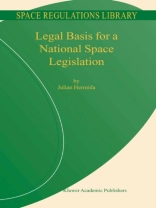A. GENERAL BACKGROUND "The foremost goal of the international community in the area [of private space launch services] should be to induce states to implement effective licensing procedures applicable to commercial ventures for which state responsibility may 1 exist. " 1. PRIVATE SECTOR PARTICIPATION IN THE SPACE INDUSTRY In the first decades of the space age, military and state security motivations indicated the direction of national space programs. Now the development of space activities depends essentially upon the possibility of recovering 2 investments. Private sector-driven commercial endeavors in outer space have been increasing exponentially and have experienced a significant quantitative growth over the last years. Spacefarers promote commercial participation of private companies in operations related to outer space, and, thus, the private sector is now increasingly providing satellite telecommunications, remote sensing, global positioning and space launch services directly to its customers. In this context, overall revenues for the worldwide space industry 3 amounted to US$ 82 billion in 2001. In the late 1990’s the transponder demand, in particular Ku- band transponders, was consistently on the rise due 4 to the escalated utilization of geostationary satellite transponders. Global positioning systems have been playing an increasingly important role in navigation, and remote sensing systems are mapping and documenting nearly 1 E. A. Frankle & E. J. Steptoe, "Legal Considerations Affecting Commercial Space Launches From International Territory", (1999) 50 IISL at 10. Emphasis added. 2 H. L.
Julian Hermida
Legal Basis for a National Space Legislation [PDF ebook]
Legal Basis for a National Space Legislation [PDF ebook]
Mua cuốn sách điện tử này và nhận thêm 1 cuốn MIỄN PHÍ!
Ngôn ngữ Anh ● định dạng PDF ● ISBN 9781402025327 ● Nhà xuất bản Springer Netherlands ● Được phát hành 2006 ● Có thể tải xuống 3 lần ● Tiền tệ EUR ● TÔI 4467285 ● Sao chép bảo vệ Adobe DRM
Yêu cầu trình đọc ebook có khả năng DRM












